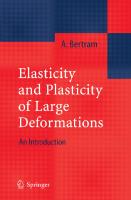Combinatorial deformations of the full transformation semigroup
297 83 2MB
English Pages [144] Year 2005
C H A PTER
1. In tro d u c tio n .............................................................................................................................. 1
1.1 The Full Transformation Semigroup Tn ................................................................... 2
1.2 Summary of Chapter 3 ................................................................................................. 4
1.3 Summary of Chapter 4 ................................................................................................. 5
1.4 Summary of Chapter 5 ................................................................................................. 7
2. P relim in aries .................................................................................. 10
2.1 The Full Transformation Semigroup Tn ................................................................. 10
2.2 The Rook Monoid R n .................................................................................................. 14
2.3 Combinatorial Representation Theory .................................................................... 17
2.4 Gram m atrices ............................................................................................................... 20
2.4.1 The full matrix algebra Mn ....................................................................... 23
2.4.2 The algebra UTn of upper triangular m atrices ....................................... 24
2.4.3 Group algebras ............................................................................................. 27
2.4.4 The Full Transformation Semigroup Tn ................................................... 28
2.4.5 The Rook Monoid Rn ................................................................................ 31
2.5 Rees matrix semigroups and Munn matrix algebras .......................................... 33
3. The x D e fo rm atio n ............................................................................................................... 38
3.1 Definition ......................................................................................................................... 38
3.2 Associativity ................................................................................................................... 39
3.3 Gram m atrix ................................................................................................................... 41
3.4 Frobenius’ Group Determinant.................................................................................. 46
3.5 Schur function eigenvalues ........................................................................................ 49
3.6 x deformation of the Rook Monoid algebra CRn, k ................................................ 54
4. The x D e fo rm atio n ............................................................................................................... 65
4.1 Definition ......................................................................................................................... 65
4.2 Associativity . ............................................................................................................ 66
4.3 Gram m atrix ................................................................................................................... 67
4.4 An,k(x) is a Munn alg eb ra ........................................................................................ 72
4.5 The Structure of An,k{x) / ^/ An,k(x) ........................................................................ 74
4.6 The y deformation ...................................................................................................... 87
4.6.1 D efinition ...................................................................................................... 87
4.6.2 Generic semisimplicity ........................................................................... . 90
4.6.3 Main result ................................................................................... 91
5. The R adical . ..................................................................................................................... 97
5.1 The radical in the case k = 1 ..................................................................................... 97
5.2 The Gram matrix, and a maximum eigenvalue .................................................... 99
5.3 Equations for the rad ical ............................................................................................... 118
5.4 Some elements of the radical ................................................................. 123
5.5 Sn a c tio n s .................................................................................. 131
BIBLIO G R A PH Y ................................................................................................................................. 137
Recommend Papers
File loading please wait...
Citation preview
COMBINATORIAL DEFORMATIONS OF THE FULL TRANSFORMATION SEMIGROUP
A DISSERTATION SUBMITTED TO THE FACULTY OF THE GRADUATE SCHOOL OF THE UNIVERSITY OF MINNESOTA BY
Jo h n Hall
IN PARTIAL FULFILLMENT OF THE REQUIREMENTS FOR THE DEGREE OF DOCTOR OF PHILOSOPHY
Dennis Stanton, Adviser
June, 2005
R ep ro d u ced with p erm ission o f th e copyright ow ner. Further reproduction prohibited w ithout perm ission.
UMI Number: 3172803
Copyright 2005 by Hall, John
All rights reserved.
INFORMATION TO USERS
The quality of this reproduction is dependent upon the quality of the copy submitted. Broken or indistinct print, colored or poor quality illustrations and photographs, print bleed-through, substandard margins, and improper alignment can adversely affect reproduction. In the unlikely event that the author did not send a complete manuscript and there are missing pages, these will be noted. Also, if unauthorized copyright material had to be removed, a note will indicate the deletion.
®
UMI UMI Microform 3172803 Copyright 2005 by ProQuest Information and Learning Company. All rights reserved. This microform edition is protected against unauthorized copying under Title 17, United States Code.
ProQuest Information and Learning Company 300 North Zeeb Road P.O. Box 1346 Ann Arbor, Ml 48106-1346
R ep ro d u ced with p erm ission o f th e copyright ow ner. Further reproduction prohibited w ithout perm ission.
/p. ^
John Hall 2005 All Rights Reserved
R ep ro d u ced with p erm ission o f th e copyright ow ner. Further reproduction prohibited w ithout perm ission.
This is to certify that I have examined this copy of a doctoral dissertation by
John Hall
and have found th at it is complete and satisfactory in all respects, and th at any and all revisions required by the final examining committee have been made.
t.'fv.x-.xs
* 2 "V «sv \V o\'\
Name of Faculty Adviser
Signature of Faculty Adviser ^
n-oos
Date
GRADUATE SCHOOL
R ep ro d u ced with p erm ission o f th e copyright ow ner. Further reproduction prohibited w ithout perm ission.
TABLE OF C O N TE N TS
CHAPTER 1. I n t r o d u c t i o n .............................................................................................................................. 1.1 1.2 1.3 1.4
The Full Transform ation Semigroup Tn ................................................................... Sum m ary of C hapter 3 ................................................................................................. Sum m ary of C hapter 4 ................................................................................................. Summ ary of C hapter 5 .................................................................................................
2. P r e l i m i n a r i e s .................................................................................. 2.1 2.2 2.3 2.4
1 2 4 5 7 10
The Full Transform ation Semigroup Tn ................................................................. The Rook Monoid R n .................................................................................................. C om binatorial Representation T h e o r y .................................................................... Gram m a tric e s ............................................................................................................... 2.4.1 The full m atrix algebra Mn ....................................................................... 2.4.2 The algebra UTn of upper triangular m a tric e s ....................................... 2.4.3 Group a l g e b r a s ............................................................................................. 2.4.4 The Full Transform ation Semigroup Tn ................................................... 2.4.5 The Rook Monoid Rn ................................................................................ Rees m atrix semigroups and M unn m atrix a l g e b r a s ..........................................
10 14 17 20 23 24 27 28 31 33
3. T h e x D e f o r m a t i o n ...............................................................................................................
38
2.5
3.1 3.2 3.3 3.4 3.5 3.6
D efinition ......................................................................................................................... A sso c ia tiv ity ................................................................................................................... G ram m a t r i x ................................................................................................................... Frobenius’ Group D e te rm in a n t.................................................................................. Schur function e ig e n v a lu e s ........................................................................................ x deform ation of the Rook Monoid algebra C Rn, k ................................................
38 39 41 46 49 54
4. T h e x D e f o r m a t i o n ...............................................................................................................
65
4.1 4.2 4.3 4.4 4.5
D efinition ......................................................................................................................... Associativity . ............................................................................................................ G ram m a t r i x ................................................................................................................... An,k(x) is a M unn a l g e b r a ........................................................................................ The S tructure of A n,k{x) / ^/ An, k ( x ) ........................................................................
i
R ep ro d u ced with p erm ission o f th e copyright ow ner. Further reproduction prohibited w ithout perm ission.
65 66 67 72 74
4.6
5.
The y deformation ...................................................................................................... 4.6.1 D e f in itio n ...................................................................................................... 4.6.2 Generic sem isim p licity ........................................................................... . 4.6.3 Main result ...................................................................................
T h e R a d ic a l 5.1 5.2 5.3 5.4 5.5
.
.....................................................................................................................
87 87 90 91 97
The radical in the case k = 1 ..................................................................................... 97 The Gram m atrix, and a maximum e ig e n v a lu e .................................................... 99 Equations for the r a d i c a l ...............................................................................................118 Some elements of the radical ................................................................. 123 Sn a c t i o n s .................................................................................. 131
B I B L I O G R A P H Y .................................................................................................................................
ii
R ep ro d u ced with p erm ission o f th e copyright ow ner. Further reproduction prohibited w ithout perm ission.
137
C H A PTER 1
In tr o d u c tio n
The representation theory of the Symmetric Group plays a large role in many areas of combinatorics, for example in the study of symmetric functions. The Full Transformation Semigroup is perhaps the most natural generalization of the Sym metric Group, and yet its representation theory is not well understood. The objective of this work is to improve the understanding of the algebraic and combinatorial structure of the Full Transformation Semigroup. T hat this structure is particularly complicated is reflected in the fact th at the associated Full Transfor mation Semigroup algebra is not semisimple. The main results follow from several attem pts to introduce parameters in such a way th at the algebra becomes generically semisimple. One such deformation leads to an eigenvalue result involving Schur functions (Chapter 3), while another makes the algebra “as semisimple as possible” (Chapter 4). In the final chapter we present several results pertaining to the radical of the non-deformed algebra.
1
R ep ro d u ced with p erm ission o f th e copyright ow ner. Further reproduction prohibited w ithout perm ission.
2
1.1
T h e F ull T ra n s fo rm a tio n S em ig ro u p Tn
The Full Transformation Semigroup on n letters, denoted Tn, is the semigroup of all set maps w : [n\ —» [n], where [n] = { 1 , 2 , . . . , n} and the multiplication is the usual composition. Such maps can be depicted in several ways; we will most often use one-line notation, for example w = 214442 denotes the map sending 1 to 2, 2 to 1, 3 to 4, etc. Maps in Tn are indexed by triples (n,P,(j)), where P is the image of the map, 7r is the set partition of [n] whose blocks are the inverse images of the elements of P, and 0 is the perm utation describing which block is mapped to which element of the image. In what follows, n = {tti, 7r2, •..} will always denote a set partition of [n] with blocks ordered by increasing smallest element. Similarly in writing P = {pi,P 2 , ■• ■} a subset of [n] we shall always intend pi < p? < .... Permutations will be written in cycle notation. W ith these conventions, we shall let
£ Tn denote the map taking x £ Ki to
P(i)E x a m p le 1. 1.1. For w = 214442 £ T6 we have 7t ( w
)
= 16|2|345, P(w) — {1,2,4},
and 4>{w) = (12)(3), the transposition exchanging 1 and 2 and fixing 3. The permu tation 0 is most easily visualized in the following diagram of w. tt:
16 2 345 L .
The invertible elements of Tn, i.e., the bijective maps, form a subsemigroup iso morphic to the Symmetric Group Sn. Thus the elements of Tn can be thought of
R ep ro d u ced with p erm ission o f th e copyright ow ner. Further reproduction prohibited w ithout perm ission.
3
as generalized permutations, and we can ask which of the many combinatorial as pects of the Symmetric Group can be extended in a meaningful way to the Full Transformation Semigroup. Let CTn denote the Full Transformation Semigroup algebra, consisting of complex linear combinations of elements of Tn. CTn has a chain of two-sided ideals
CTn = /„ D /n-i 2 ... 2 A 2 / 0 = 0, where for 1 < k < n, I k as a vector space is the complex span of the maps of rank less than or equal to k (the rank of a map is the cardinality of its image).
For
1 < k < n define the algebras A ntk = I k / I k - i- We can think of A n>k as being the algebra spanned by the maps of rank k, where two maps multiply to zero if their composition has rank less than k. The top quotient A n>n is isomorphic to C Sn, the group algebra of the Symmetric Group, and is therefore semisimple. However A n




![Noetherian Semigroup Algebras [1st Edition.]
9789048174485, 9048174481](https://ebin.pub/img/200x200/noetherian-semigroup-algebras-1st-edition-9789048174485-9048174481.jpg)





